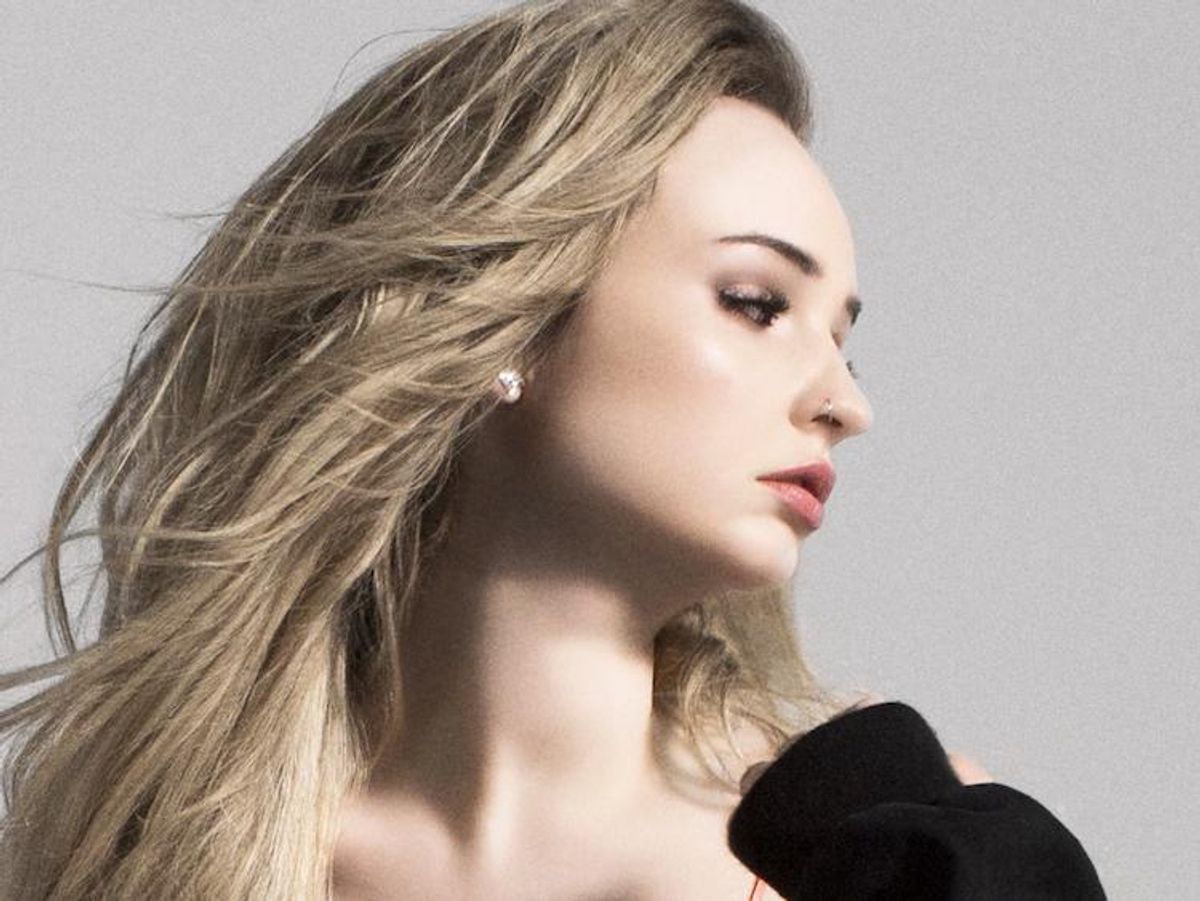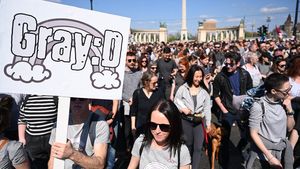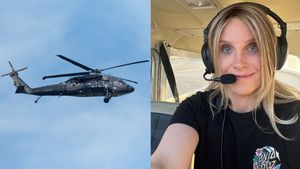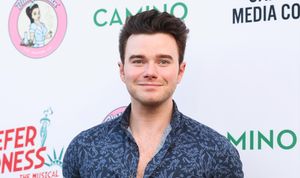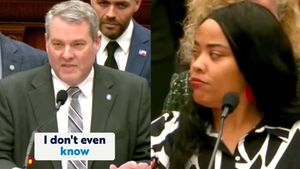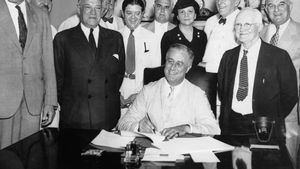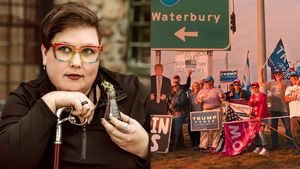Kim Petras has a massive opportunity. As an openly transgender woman, the 24-year-old breakout pop artist is entering music at a particularly important time, when unapologetic queer visibility is as needed as escapism--and she can tackle both at once.
Her debut single, "I Don't Want It All" is a strong first release, with Dr. Luke's shimmering synth production and tongue-in-cheek lyrics about girls in Los Angeles who have it all. "I want all my clothes designer," Petras sings with sass. "I want someone else to buy 'em. And If I don't get it right now, I don't want it at all."
A pupil of soaring Max Martin-style pop, Petras has spent her life pursuing the dream of becoming a femme superstar. After she began HRT at age 12, she became the world's youngest recorded person to receive gender affirmation surgery at age 16, and devoted the rest of her teens to songwriting in her German native.
Now with more than one million streams on Spotify, we caught up with Petras to learn how she broke into the music industry, how she views her responsibility as a transgender role model and why she chose to collaborate with Dr. Luke, who's been accused by Kesha of sexual assault.
OUT: How did you break into the music industry?
Kim Petras: Since I was 12 or 13, I started being obsessed with writing songs, and really worked on getting better at it. I was writing for projects in Germany--I got a laundry detergent commercial and one for a cellphone. I was around 17 or 18 when that happened, but I always wanted to go to America because I wrote English songs and never really liked German language songs that much.
I was always obsessed with Max Martin, pop music and the whole theory of it. I wrote songs on my laptop on Garageband at home, and did YouTube covers that got a lot of views. I eventually started getting sent tracks to write on and saved enough money to come to LA. I came out here for two weeks the first time, and started meeting new producers and writing with everybody.
Do you find writing pop music to be a challenge?
There's a lot that goes into it. Melody is super important, and being catchy and gettable. At the same time, I feel like the concept and lyrics are always important, to me especially--that the song has a unique concept. There's a lot you need to think about, like making the chorus pop and having it be on higher notes--the pre-chorus that pops against it. Little things like that, but also I don't think there's rules that you have to stick to with pop music. My whole passion was always to find the concept and words. That's what really makes me happy when everything comes together.
What's the concept behind "I Don't Want It All." It sounds like a very LA song.
[Laughs] It is very LA. I love the girls that I meet out here, but a lot of girls really get whatever they want, whenever they want. And I guess it's a fun fantasy to think about that life because it's not very much like my life. My life isn't very glamorous, I'm not living fancy or anything. But it's still fun to imagine that.
You're internationally famous for being the youngest person on record to undergo gender affirmation surgery. Moving forward with your career, is this something you want to be known for?
It's a part of me, and the documentary I did helped so many kids. My parents were really supportive of me, so I got to start [transitioning] really early. It's just a part of my story. The past few years I've worked on becoming a good songwriter. That was really important to me--being taken seriously as a songwriter. Things like that were really all I thought about. But still, I'm transgender and that's a part of my story. I don't feel embarrassed by any of that.
It's interesting, the headlines about your surgery then were so sensationalized, but now we've reached a point where that's unacceptable.
100 percent. They were definitely over sensationalized. I really just did one documentary and a bunch of people wrote about it. It's not like I did a million interviews, it just became this thing.

Photography: Colby Koch
Right now, it feels like an important time for mainstream pop music to have an artist, who's transgender.
For sure. It's just who I am. My goal is to be a great artist and I just happen to be transgender.
Do you think you have a responsibility to the transgender community as a visible, public musician?
I definitely always have a responsibility to the transgender community because I'm a part of it. But I don't want to let anybody down. It's always going to be important to me to help young transgender kids. You can be a cool person and you can live a cool life being transgender. It's definitely difficult to have role models being transgender. At the same time, I'm just having fun making my music, being artistically whatever I want to be and being free. My music's not about me being transgender, but I'm writing songs about how I feel, what I'm obsessed with, what I love, what I hate, what makes me happy--just human emotions. It's not songs specifically about being transgender.
Of course. You're reflecting on your life, just like anyone else, and that's influenced by a number of things--not just gender identity. Who were some of your role models growing up?
My role models were Boy George--I'm obsessed with Boy George--and Cyndi Lauper. I was obsessed with Britney Spears, Christina Aguilera and Destiny's Child. I remember Boy George on an MTV Rewind special, and he looked like an alien--I loved it.
We're long overdue for a Boy George revival.
[Laughs] Hell yeah, desperately. I mean, "Do You Really Want to Hurt Me" is such a jam.
Related | OUT100: Boy George
Is "I Don't Want It All" part of a forthcoming debut full-length album?
Definitely. I've written probably over 100 songs for my album, so I just weeded them out and picked the great ones. I definitely want to make a heartbreak album. There's a lot of songs on there about escapism--what I want my life to be versus what my life really is. I've got like eight finished for a record, so I'm pretty close. I'm just finishing production on all the songs, but putting out an album is really important to me. It's just been me in the studio and never seeing the sunlight--having no friends. [Laughs]
Production-wise, what was the process for creating the single?
Aaron Joseph and I came into the studio to get some tracks from Cirkut. We just came through the session with Dr. Luke, Lil Aaron and Cirkut, and started a track up and it just came out. I sang, "I want all my clothes designer," and then Lil Aaron was like. "I want someone else to buy 'em." That's how the song started.
Dr. Luke's been accused of sexual assault by Kesha in a highly publicized, ongoing court case. Why did you decide to work with the controversial producer on your music?
It's all about the song. I was skeptical, but my friend Aaron Joseph, who I wrote this whole record with, had nothing but nice things to say about him and set up a meeting. And to me Luke's been nothing but nice and I've had a really fun time writing and working with him. Also, I've always been a fan of Luke, and I'm learning a lot from him. I've always loved his sound.
